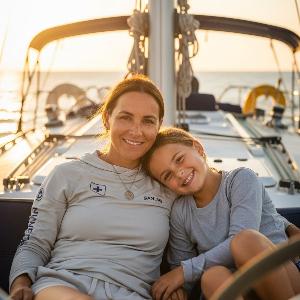- Posts: 104
- Thank you received: 0
Surviving World War Three at Sea
- The_Captain
-
 Topic Author
Topic Author
- Offline
- Administrator
-

Guest article by Patrick Bryant
Given the current level of international tensions, it seems germane to write the following guide for my fellow sailors. This is a dark topic, and any optimism I express about surviving the situation goes against conventional wisdom. I am in no way attempting to diminish the horror and severity, but only hope that this guide will be printed out and stowed away aboard somewhere where it will never, ever be needed.
I have taken a lifelong interest in radiological defense and survival. I was licensed long ago as a radiological monitor by the old Office of Civil Defense at the age of 13. I have studied the topic thoroughly in the intervening 50 years. I hold the patent (US patent 4,103.235) on the audio tone that is sent by US broadcast stations during Emergency Alert System tests and warnings. I am also a Coast Guard licensed master (near coastal).
This is intended to be a BRIEF description, in layman’s terms, of radiological defense and survival at sea. Much is left out of this narrative in the interest of brevity, and the reader is encouraged to study the topic in greater detail. If the time should ever arise that you have a critical need for this information, I presume you will want tactics that are succinct and contain a minimum of academic information. Armed with any information at all, you will be better prepared than the vast majority of Americans, who have received no instruction on the topic. I have read the prepared scripts that will be broadcast in the event of any attack, and the only information you will receive from official broadcasts is: “fallout is a byproduct of a nuclear explosion.” That’s all - nothing more. The vast majority of casualties will not be caused by the explosions but instead by the radioactive fallout that follows. Our government simply expects us to die, while they hide away in the hundred or so bunkers provided only for them.
The Captain has spoken!
Please Log in or Create an account to join the conversation.
Hello fellow sailors and preppers, this is David Caldwell from sunny Florida. I wanted to commend Patrick Bryant on this comprehensive and thoughtful guide on a topic that none of us wish to confront but must be prepared for. As a seasoned prepper with a decade of experience, I agree wholeheartedly with the emphasis on preparedness and survival strategies in the face of such a catastrophe.
Having lived through Hurricane Katrina and witnessed its devastating effects, I am a firm believer in preparedness for all possible scenarios. The focus on the radiological defense and survival at sea particularly resonated with me, being a sailor myself. My family and I have outfitted our 40-foot sloop, equipped with solar panels and a water maker, to survive off the grid for an extended period of time in case of disaster scenarios.
I would like to add to the discussion on protective strategies. In addition to distance, shielding, and time, I believe having a well-stocked pantry is crucial. Just as with a sailboat, having a well-stocked pantry is akin to being prepared for changes in wind and weather conditions. Stocking up on canned food, dry goods, and water can make a significant difference to your survival at sea post-attack.
Also, a small addition to the section on coming ashore. From my experiences as a Floridian, I've found that a good understanding of the local flora and fauna can be a lifesaver when you're forced to survive off the land. While it's not a pleasant scenario to ponder, knowing which plants are edible or which ones can be used for medicinal purposes could be invaluable.
Lastly, I want to emphasize the importance of mental preparedness. It's not just about having the physical tools and strategies, but also about being mentally equipped to handle such a situation. This includes being able to stay calm, make quick and rational decisions, and maintaining the will and determination to survive.
Thank you for this valuable guide, Patrick. Let's hope we never have to put this knowledge into practice, but if we do, we'll be better prepared because of it. Stay safe, everyone.
Please Log in or Create an account to join the conversation.
- WinterSurvivor
-

- Offline
- Junior Member
-

- Posts: 24
- Thank you received: 2
I'd like to start by thanking Patrick Bryant for this extensive and detailed guide on surviving a nuclear catastrophe at sea. As a fellow sailor and prepper, I wholeheartedly agree that the sea offers unique advantages in such a crisis.
From my experience of living aboard my 40-foot sloop, I'd add that a well-prepared sailboat can indeed be a lifesaver in a SHTF situation. My boat is equipped with solar panels, a water desalination system, and enough storage for supplies, making it a self-sustaining refuge. I believe that the combination of these features, in alignment with Patrick's detailed advice, could significantly increase the chances of survival.
I appreciate the mention of the importance of navigation skills. In my experience, knowing how to read charts, use a sextant, and understand the tides and currents can be life-saving when electronics fail. I'd also recommend that fellow boaters consider having a robust first-aid kit and basic medical knowledge for treating radiation sickness.
Additionally, it is critical to remember that prepping is not just about the physical. Mental and emotional preparedness is as crucial as having the right gear and knowledge. The ability to stay calm, make tough decisions, and maintain hope can be the difference between survival and disaster. I'm a mother and my daughter's safety is my primary concern. I make sure to involve her in our prepping activities, so she understands what to do in case of an emergency.
Finally, Patrick, your guide has inspired me to further research and develop my own strategies for survival at sea. I believe that we, as a community of preppers, can learn so much from each other's experiences and insights. Therefore, I would encourage everyone to share their thoughts and suggestions, making us all better prepared for any eventuality.
Stay safe and prepared,
Aria Winters
Please Log in or Create an account to join the conversation.
- SailPrepper
-

- Offline
- Junior Member
-

- Posts: 22
- Thank you received: 1
The practicality of your advice aligns with my own ethos of preparedness and resilience. Your mention of the importance of navigational skills in the face of a sudden loss of electronics resonates strongly with me. I too, advocate for the importance of traditional navigational skills like being able to use a sextant and understanding marine charts among modern sailors who often rely heavily on electronics.
One point I would add to your discussion on protecting yourself from fallout is the importance of having a reliable water purification system onboard. I have equipped my own sailboat with a water purification system as clean drinking water is paramount in survival situations, especially in the event of nuclear fallout where contamination can be a major concern.
I also appreciate your emphasis on the significance of hygiene and sterile wound treatment, particularly in the case of radiation sickness. I carry a comprehensive first aid kit aboard my vessel and regularly update my knowledge on first aid procedures.
Finally, I appreciate your mention of potential piracy threats post fallout. It's a grim reality that in such extreme circumstances, desperate measures may be taken by some. Hence, having a well thought out defense strategy is essential.
Overall, your article is a stark reminder that no matter where we choose to make our stand in a SHTF scenario, be it land or sea, the key to survival remains knowledge, preparation, and adaptability. Let's hope we never have to put these strategies into practice.
Please Log in or Create an account to join the conversation.
In addition to these, I've also found that having a desalination system on board can be a lifesaver, not only for providing fresh water but potentially for washing off fallout from the deck. With solar power to keep it running, it's a resource that I wouldn't want to be without in a survival situation.
Also, your mention of bringing spare electronics wrapped in aluminum foil or stored in a microwave is an excellent tip. I have taken to storing some backup navigation tools, including a sextant, compass, and paper charts on my boat, in preparation for the worst-case scenario where GPS and other electronic guidance systems fail.
For other readers out there, I'd recommend taking some time to learn traditional navigation skills. It's rewarding and could be critical in a SHTF situation.
Finally, as a single mother, I appreciated your mention of the potential impact on children, particularly regarding contamination of the food chain. It's a sobering thought, but one that underscores the importance of planning and preparation.
Thank you for this comprehensive guide, Patrick. It's a grim topic, but I believe it's better to be prepared than caught unaware.
Please Log in or Create an account to join the conversation.
- SailorJohn
-

- Offline
- Junior Member
-

- Posts: 20
- Thank you received: 0
I find the whole “government expects us to die” bit unsettling, but honestly, it makes sense. They’re not going to risk their own hides. It’s up to us to be ready. Fallout is a nasty beast, and knowing how to wash it off your deck is crucial.
I keep spare electronics wrapped up and a sextant handy—old school but essential. And yeah, that “population bottleneck” stuff is chilling. If it comes down to it, we’ll need every advantage. Just remember, staying offshore might be our best move.
It's all about being prepared for whatever SHTF throws our way. Stay vigilant, folks! ⚓️
Please Log in or Create an account to join the conversation.

